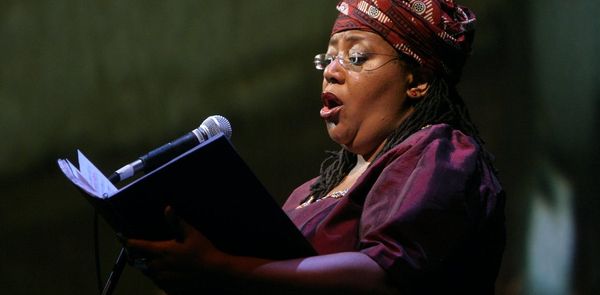
When Caroline Shaw became, at the age of 30, the youngest ever winner of the Pulitzer prize for music, she described herself as “a musician who wrote music” rather than as “a composer”. Partita, her winning score, is a joyful rollercoaster of a work, encompassing song, speech and virtually every vocal technique you can imagine. It was written for Shaw’s own group, Roomful of Teeth.
Eight years on, she’s still wary of defining herself too narrowly. “Composer, for some people, can mean something very particular,” she says, “and I’m trying to make sure I don’t get swallowed up into only one community.” Not that Shaw’s range shows any sign of narrowing: even a small sample of her work over the past few years throws up an array of names not often seen together: rappers Kanye West and Nas, soprano Renée Fleming, mezzo-soprano Anne Sofie von Otter, Arcade Fire’s Richard Reed Parry, pianist Jonathan Biss. She has written film scores, sung on others, was the soloist in her own violin concerto, and even managed a cameo appearance as herself in Amazon Studio’s comedy drama Mozart in the Jungle. A year ago, Orange, a recording of her string quartets, won the Attacca Quartet a Grammy.
This year brings three more recordings. Narrow Sea, just released, is the first of two featuring four-piece ensemble Sō Percussion, teaming them with two contemporary classical stalwarts, soprano Dawn Upshaw and pianist Gilbert Kalish. The title work is based on the lyrics of four traditional North American songs, all featuring the River Jordan as the dividing line between this world and the next.
“Growing up in North Carolina,” says Shaw, “I’d been aware of some of these songs for a long time. But what I was interested in was how we think about death.” Her dad is a pulmonologist, an expert in respiratory disorders. “I used to see a lot of his patients towards the ends of their lives – I would play violin to them. It’s something I’ve always been drawn to write about.”

Narrow Sea was written as a companion piece to The Winds of Destiny by George Crumb, whose enduringly avant-garde electric string quartet work Black Angels provided Shaw with her first experience of contemporary classical music as a teenager – a baptism by fire. Crumb and Shaw are very different composers but, as well as sharing an affinity for the string quartet, both find joy in unexpected sounds. At one point in Narrow Sea, the pianist and all four percussionists set about the piano strings as if strumming an enormous dulcimer. A subtler approach sees two ceramic bowls of water used as instruments, with Upshaw taking a cup and pouring water from one bowl to another, changing their pitch.
Shaw also has an album on the way: Let the Soil Play Its Simple Part, a collection of songs she sings herself, which she and Sō Percussion have put together “as a band”. Most are original, but one is a cover version of sorts, stripping down and obsessing over the chorus of Abba’s Lay All Your Love on Me – typical Shaw in its playful seriousness. “I grew up listening only to classical music,” she says. “The big shift was discovering Fiona Apple when I was 19 or 20. Harmony has always been the thing that cuts me in. It’s one of the things I love about pop music, when a certain chord progression shifts and drops in a certain way.”
The idea of what’s called an album and what isn’t – album isn’t a word much used in the classical music world – has been on Shaw’s mind, given that so many have come to her music through Kanye West. They met backstage after a performance of Partita in Los Angeles. “He was working on an iPhone game about his mother, who died a few years ago. There was an animation sequence where she’s flying to the sky, and he said, ‘I really hear your music for this moment.’ I’ve always cherished that.”
A few weeks later, a producer approached her to work on an orchestral concert of West’s album 808s and Heartbreak, but she wasn’t interested in the expected kind of collaboration. “I didn’t want that to be my classical-pop relationship, where the classical person arranges for orchestra. There are other ways of thinking about this.”
So she took West’s song Say You Will and remixed it, adding her own vocal and violin tracks in a way that amplified the original’s obsessiveness. The result was an invitation from West to work on his album The Life of Pablo, and in 2016 she went on tour with him, playing huge arenas across the US. “I mean, I’m this geeky violin kid,” she says, “and I’d never seen this before, this kind of energy – 20,000 people just losing their minds.”
When West voiced support for Donald Trump, she left the tour. “I can’t have any part of that.” But she has worked with him again since. “One of the things I like is that he talks to a lot of different artists as he’s making music, people in different arenas. That’s something I’ve embraced in my own work – the ability to have several tabs open, to be reading a lot of different things while writing a piece, to let all those things shape the construction of the material in ways you can’t necessarily articulate.”

Being open to so many influences hasn’t always been straightforward. One of the vocal techniques referenced in Partita was Inuit throat-singing, which Roomful of Teeth studied with two representatives of the tradition. In autumn 2019, another Inuit singer, Tanya Tagaq, claimed on Twitter that Partita was a work of appropriation. Shaw was devastated.
“I stopped any performances of Partita at that moment. We had to figure this out. I fully respect what was said. Then a few months later Covid hit, so we haven’t performed it at all since then.” How does she see Partita working in the future? “I’m going to change the section that I never would have written had the conversation been different 10 years ago.”
Shaw misses the early evening buzz in the streets outside her New York apartment close to Broadway and, like all musicians, she can’t wait for live performances to resume. She’s particularly enthusiastic about a piece she’s writing for the dance artist Vanessa Goodman, using bits of Chopin and Bach from 110-year-old wax cylinder recordings: “It’s about the body as an archive – it feels like the inside of my brain and my whole experience with music is being poured out.” Then there’s her first opera, for the 2022-23 season at Chicago’s Lyric Opera, where it will be part of a triple bill directed by the innovative Yuval Sharon.

“It’s the hardest thing I’ve done: coordinating with all these different parameters, some known and some unknown, then making something that will be effective dramatically at a distance, and with a certain kind of voice.” Are there works she looks to for inspiration? “I can tell you the things I love, but I wouldn’t say they are reference points. I absolutely love Puccini and Verdi, La Traviata – these stories where you’re drawn into someone’s internal experience. I love being moved. I love the Trio in Der Rosenkavalier. One day I want to be able to do that, but I’m not quite ready.”
In the meantime, working alone at home isn’t all bad. “Making music with my laptop, I can determine the sound that will always come out, the articulation of the edges of the sound, the balance, the vowel colour, the colour of the synth.” Still, it has its limits. “I also love unpredictability. I love hearing one string quartet taking a piece and playing it completely differently from another. There’s nothing more joyful than that.”
• Narrow Sea is out now on Nonesuch. Let the Soil Play Its Simple Part will follow in summer.










